Taylor Force Act Reduces U.S. Funding to Palestine Until the Country Stops Rewarding Terrorists : A Well Thought Out Scream by James Riordan
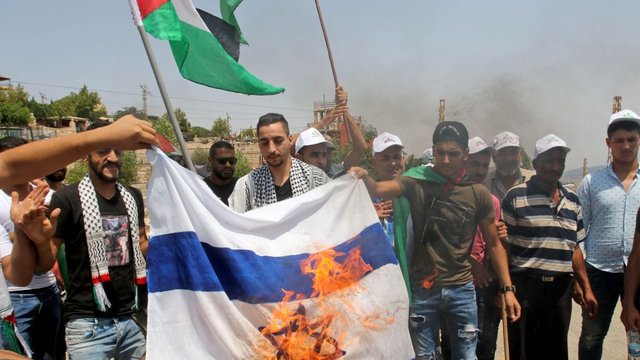
So all this time Americans have thought that suicide bombers and other terrorists from the Mid-East were sacrificing their lives so that they would be rewarded by Allah with an afterlife of great abundance including hundreds of virgins and other distinctly more hedonistic than heavenly values, but did you know that, in Palestine at least, the families of those terrorists are not only greatly honored but paid large amounts of cash. So much so that dying as a suicide bomber offers a very plausible way to relieve your family from the lifelong struggles of horrible poverty in the Mideast. Did you know that since the 1993 Oslo Accords the United States has permitted two important Palestinian organizations — the Palestine Liberation Organization (PLO)and the Palestine Authority (PA) to subsidize the families of those killed committing terrorist acts. — to get away with murder or, at least, with honoring murder. Terrorists who murder have been honored with streets, campsites, schools, and clinics being named after them. They are considered martyrs for killing innocent Jews and others. Co-sponsored by Lindsay Graham, Dan Coats and Roy Blunt, The Taylor Force Act was named in honor of Taylor Force, a West Point graduate who had served tours of duty in Iraq and Afghanistan, and was stabbed to death while with a Vanderbilt University tour group in Israel. By any stretch of the imagination, the stipends offered for such killings lavish incentives to commit violence. In an unusual display of bipartisanship, the U.S. House of Representatives overwhelmingly passed The Taylor Force Act, on March 23rd. It is a bill to reduce U.S. funding for the Palestinians unless official bodies stop subsidizing the families of killers.
Taylor Force, who was stabbed to death two years ago. As heartbreaking as it was for Taylor’s family to learn of their son’s death, those feelings grew worse when they learned the assailant was hailed as a hero back home and richly rewarded for the murder of their son with money from US taxpayers.
Stuart and Robbi Force were heartbroken to learn their son Taylor died in Israel, stabbed by a Palestinian terrorist. Those feelings grew worse when they learned the assailant was hailed as a hero and richly rewarded for the murder of their son with money from US taxpayers. “It was something 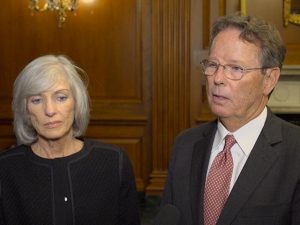 totally foreign to us, we couldn’t really process that, we still probably can’t,” Stuart Force told CBN News.
totally foreign to us, we couldn’t really process that, we still probably can’t,” Stuart Force told CBN News.
While the Force family mourned the death of their son, the terrorist’s family received compensation from the Palestinian Authority for the attack. Some of that compensation includes a pension for life, free tuition, free health insurance, free clothing allowance and a free monthly stipend.
The Palestinian Authority (PA) argues cynically that such payments relieve poverty. Alas, they do. However, they do so at the price of murders. Would passage of the Taylor Force Act halt or add to terrorist activities? The answer is obvious. Eliminating the incentive for terrorism will reduce its presence. Clearly pathologies of the kind the world has experienced from the Middle East won’t disappear, but the Taylor Force Act is a mitigating influence in the right direction.
This is arguably the most barbaric government policy on the globe since the crime of murder was being endorsed by officials and U.S. taxpayers were partially responsible for underwriting the crime. It is conceivable The Taylor Force Act could have a salutary effect on President Mahmoud Abbas and the PA since it could open a pathway to an accord which might yield Palestinian jobs and opportunities. The PA has two pools to deal with “pay-to-slay” arrangements with combined budgets exceeding $300 million annually. In fact, payments to “martyrs” dwarf the average monthly salary of an ordinary working inhabitant of the West Bank. De-incentivizing murder seems like the obvious thing to do. The passage of this act came a day before President Trump conferred recognition of Jerusalem as the Israel’s capital. Trump said his decision was a “recognition of reality.” The White House also noted that the decision would not have any impact on the future of boundaries as negotiated in a final status agreement.
Clearly the physical location of the American embassy is not material to a future peace deal. But the back-to-back actions on the Taylor Force Act and the embassy represent the unequivocal Trump administration support for the state of Israel, a condition that has not been the case heretofore.
The Palestine Mujahidin and Martyrs Fund was established in 1964 by Fatah to recompense the families of dead and wounded militants.[5] In 1971 it was replaced by the Society for the Care of Palestinian Martyrs and Prisoners. The Society defined as “military martyrs” not only as Palestinian fedayeen killed during terrorist operations, but to include fedayeen who died of natural causes while on active service. Their families received cash stipends. Non-members of the Palestine Liberation Organization killed during any kind of encounter with Israeli security forces were given a one-time payment; this created an incentive for families to apply posthumously to have their dead relatives reclassified as fighters. The scheme has been described as “pay for slay“, and has been criticized as encouraging terrorism.[1] Martyrs Works Society, was founded in 1970, and handled some of the martyr payments and provided employment in the Palestinian refugee camps in Lebanon in the 1970s.
The payments were routinized during the Second Intifada (2000–2005). In 2016, payments were made to 35,000 families, including the families of suicide bombers, from a 2016 annual budget of $170 million. The stipend is higher than the average Palestinian wage.
The Palestinian Authority Martyrs Fund is a fund operated by the Palestinian Authority (PA) for the purpose of paying a monthly cash stipend to the families of Palestinians killed, injured or imprisoned for involvement in attacking, assisting in attacking, or planning to attack Israelis, or for other types of politically-inspired violence, including riots, violent demonstrations, and throwing rocks, and also for paying cash stipends to the families of innocent bystanders killed during violent events. In addition, it provides pocket money to all Palestinians imprisoned in Israeli jails for ordinary crimes.
In 2010 (or 2014), the mounting criticism of the payments led to the PA transferring management of the Martyrs Fund to the Palestine Liberation Organization (PLO), which now disburses the government-funding to terrorists and their families.
The question of whether militants from all political factions will receive such payments from the PA has been highly contested within Palestinian society, with President Mahmoud Abbas withdrawing, then in 2009 restoring, such payments for prisoners belonging to the PLO, but the government claims that it does not make such payments to families of prisoners belonging to Hamas or Islamic Jihad.
In July 2018, Australia ended direct aid to the PA through the World Bank, amid growing concerns that Australia’s tax dollars may be helping to fund terrorism.
The funding system pays regular stipends to imprisoned individuals and to the surviving families of deceased individuals. The agencies that disburse the funds employ over 500 bureaucrats. Funds are dispersed via separate agencies, one for families of prisoners and the other for the general population. Both agencies are “PLO institutions,” but they are both funded by the PA.
According to a report by Yossi Kuperwasser, of the Israeli advocacy group Jerusalem Center for Public Affairs, in 2017 half of the $693 million that the PA receives as foreign aid, $345 million, was paid out as stipends to convicted terrorists and their families. Israeli Prime Minister, Benjamin Netanyahu, repeated this claim in a speech to AIPAC in 2018. According to the Washington Post’s fact checking, the $350 million figure requires a broad brush classifying all recipients as terrorist; and the picture regarding funding is considered fuzzy because Palestinian budget lines combine terrorist and non-terrorist funding and primarily since the definition of a terrorist is disputed.
The Washington Post’s analysis showed that in 2017, $160 million was paid to 13,000 beneficiaries of “prisoner payments” ($12,307 per person) and $183 million was paid to 33,700 families in about in “martyr payments” ($5,430 per family), of which:
- $36 million is estimated to be paid to prisoners serving sentences of >20 years
- $10 million is paid to former members of the security forces
- $1 million is estimated to be paid to families of the 200 suicide bombers
- $10 million is paid to the families of the Palestinians with life terms, lengthy sentences and in the security forces
Prisoner fund
Under the Amended Palestinian Prisoners Law No. 19 (2004), prisoners who have served a year or more in an Israeli prison are entitled upon release to health insurance and tuition free school, university and professional education. If they become civil servants, the law stipulates that the Palestinian Authority will “pay his social security and pension fees . . . for the years he spent in prison.” Incarcerated individuals are entitled to monthly stipends “linked to the cost-of-living index.” The 2013 amendments to the law entitle indiviuals released from prison a preference in getting jobs with the Palestinian Authority, and stipulates that the PA “will make up the difference” if the civil service salary “is lower than the salary he received in prison.”[12] Females who have served 2 years in prison, and males who have served 5 are entitled to receive stipends for the rest of their lives.
Foundation for the Care of the Families of Martyrs
The Foundation is dedicated to assisting an Arab who has been “wounded, killed, or otherwise affected as a result of their joining the revolution or the presence of the revolution” against Israel and operates within the PA’s Ministry of Social Affairs. In 2016 it supported 35,100 families.[3]
Countering Palestinian Authority claims that this is a welfare fund, the World Bank has stated that, “the program is clearly not targeted to the poorest households. While some assistance should be directed to this population, the level of resources devoted to the Fund for Martyrs and the Injured does not seem justified from a welfare or fiscal perspective.”
Stipends
Stipends are paid to families of both prisoners and Palestinians killed in contexts ranging from political demonstrations that turn violent where protesters are killed by non-lethal riot control methods (such as being hit by a tear gas canister) and to individuals imprisoned for “common crimes”. The fund also pays $106 a month in “canteen money” to all imprisoned Palestinians, including those imprisoned for non-political crimes such as car theft and drug dealing, for prisoners to spend in the prison canteen.
Families of individuals killed by Israeli security forces are paid stipends of about $800 to $1,000 per month. The families of convicted Palestinians serving time in Israeli prisons receive $3,000 or higher per month.
Douglas J. Feith calls the stipends “cash incentives” to spur Arabs to undertake car ramming and stabbing as a terrorist tactic.
Salam Fayyad, a former PA Prime Minister and Finance Minister, stated that between January 1995 and June 2002 the fund distributed NIS 16 million to families of prisoners annually, and between June 2002 to June 2004 NIS 88.5 million annually.
In 2017 the National Association of the Martyrs’ Families of Palestine demanded cost of living increases in their stipends, which had been unchanged since 2011.
Private charities including the U.S. based Holyland Foundation have been accused of funding the stipends.
Hamas has operated a separate Martyrs Fund since well before the 2007 insurgent coup d’etat resulting in the Hamas’ takeover of Gaza. In 2001 Sheik Ahmed Yassin, the founder of Hamas, boasted that Hamas payments to the families of prisoners and of suicide bombers totaled between $2 and $3 million. But according to a 2001 Israeli government report, the families of prisoners received an initial lump sum payment of $500 – $5000, with monthly stipends of about $100, with higher payments for the families of Hamas members.
The Hamas-controlled Unlimited Friends Association for Social Development (UFA) in Gaza is supported by eight registered U.S. charities. By its own account, UFA distributes cash both to the needy and to “the families of martyrs and prisoners,” and ” “families of martyrs of the Palestinian people.”
For example, the family of the teenage murderer of American-Israeli Ari Fuld is set to receive about $400 a month for the next three years from the Palestinian Authority, the Jerusalem Post reported. It’s a clear demonstration of the Palestinians’ “pay to slay” policy in action. Forty-five-year-old Fuld was stabbed in the back by a Palestinian terrorist on Sunday outside the mall in Gush Etzion, Judea, also known as the West Bank. Fuld managed to chase, shoot and wound his 17-year-old attacker Khalil Jabarin before he collapsed and died.
Caption Ari Fuld at the Western Wall, Photo, FB PTS2



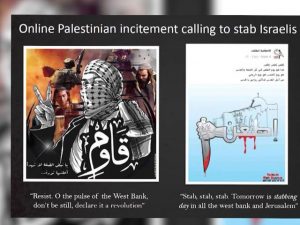
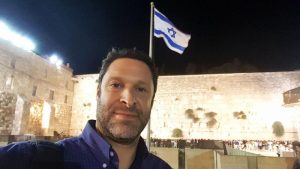
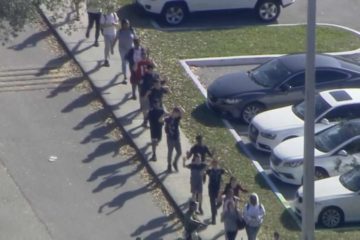
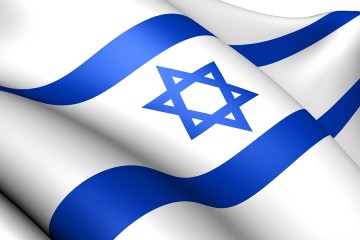


No Comment